An investigation published by Mongabay revealed that Costa Rican authorities authorized the transit of 12.6 tons of shark fins from Nicaragua between 2023 and 2024. This resulted in the death of at least 15,000 sharks, as well as a violation of national laws and global efforts to conserve these species, as agreed upon by the International Union for Conservation of Nature (IUCN) and the Convention on International Trade in Endangered Species of Wild Fauna and Flora (CITES).
According to the media, Costa Rica has been living in contradiction with its conservation policies in recent years. On the one hand, it has passed laws to protect wildlife, but on the other, it has facilitated the export of shipments of shark fins from endangered species through re-exportation, according to an investigation by the Center for the Restoration of Threatened Marine Species (CREMA).
The interview published by Mongabay reveals that “re-exportation” is used to cover up illegal catches, denounces the inaction of the Ministry of the Environment, and highlights the influence that the fin export industry has on public policy in Costa Rica.
Randall Arauz, marine biologist and consultant on marine conservation policy at CREMA, told the media outlet that Costa Rica maintains practices that tolerate fishing for these species and facilitate their commercialization.
“We had managed to affect fishing activities targeting hammerhead sharks, which are highly prized for their fins, but in 2017, the Costa Rican government declared that sharks were no longer wildlife, but commercial species,” the expert pointed out.
Arauz mentioned that from 2015 to 2021, Costa Rica continued to allow hammerhead shark fishing and the sale of their fins. “The only destination for hammerhead shark fins is for export; they are not consumed here,” he added.
Countries must keep records of products that could not be exported to ensure that they do not enter the illegal market, but Costa Rica, by refusing to implement controls, facilitates the illegal export of these products.
Throughout 2024, Costa Rica carried out five re-exports of shark fins originating in Nicaragua and then sent to Hong Kong. “We obtained the invoices and found that of the nearly 12 tons, Nicaragua re-exported 1.8 tons of hammerhead shark through Costa Rica, while the other ten tons consisted of silky shark, thresher shark, tiger shark, and bull shark,” he denounced.
The specialist highlighted that the hammerhead shark is critically endangered. According to the International Union for Conservation of Nature, its populations have declined by 95% and up to 98% in some regions of the world. Sadly, despite this situation being recognized by international institutions, fishing continues and fins continue to be exported.






